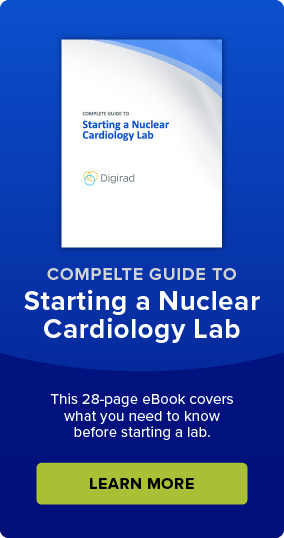There are dozens upon dozens of services that a cardiology office may offer. It can be overwhelming for a newly independent cardiologist to decide what technology and services to invest in first. Digirad works with thousands of cardiologists and we’ve compiled the five most essential services for any cardiologist thinking of opening his or her own office.
Basic EKG
Perhaps most essential for any cardiology office is an electrocardiogram (EKG) machine in order to test for problems with the electrical activity of a patient’s heart. EKGs are useful for evaluating the possible causes behind unexplained chest pains as well as the efficacy of medicines and medical devices, such as a pacemaker.
Stress Test
Stress tests are essential for determining the amount of stress that a patient’s heart can manage before developing either an abnormal rhythm or evidence of ischemia.
Echocardiography
Echocardiography is routinely used in the diagnosis, management, and follow-up of patients with any known or suspected heart diseases. Echocardiography can help detect cardiomyopathies, such as hypertrophic cardiomyopathy, dilated cardiomyopathy, and many others. Currently, it is one of the most widely used diagnostic tests in cardiology. Stress echocardiography is a subset of echocardiography. By utilizing stress tests during patient evaluation, stress echocardiography may help determine whether any chest pain or associated symptoms are related to heart disease by visualizing wall motion differences between stress and rest.
SPECT Myocardial Perfusion Imaging
SPECT myocardial perfusion scan (MPI) is a nuclear cardiology procedure that highlights the function of a patient’s heart muscle. MPI is useful for diagnosing a variety of heart conditions such as coronary artery disease, hypertrophic cardiomyopathy, and heart wall motion abnormalities. Images are usually acquired at both Stress and Rest allowing physicians to evaluate heart muscle perfusion to determine normalcy, ischemic, or infarcted areas.
Full Spectrum Cardiac Rhythm Event Monitoring
Cardiac rhythm event monitoring includes a variety of noninvasive tests necessary for all cardiology offices. Among the types of monitoring tests are Holter monitoring, event monitoring, and mobile telemetry, all of which involve collecting data from the patient over a period of time for suspected cardiac arrhythmias or to measure the efficacy of treatment.



